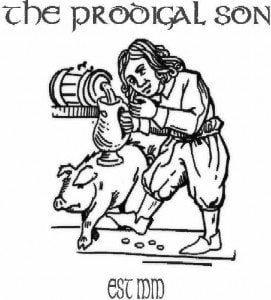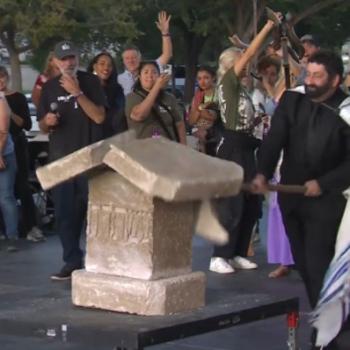“Now his elder son was in the field; and when he came and approached the house, he heard music and dancing.”
That’s Luke 15:25, smack dab in the middle of the wonderful, famous parable we call “The Prodigal Son.” So I must have read that verse dozens of times while growing up in our fundamentalist Baptist church and attending our private Christian school. And I must have heard it read out loud by others dozens of times more.
But in all that time I somehow never noticed that “music and dancing.” And I never thought about what it meant to hear that story read from the very same pulpits and platforms where I regularly heard pious warnings condemning music and dancing. (Not condemning all music, of course — only the sort of music that might make anybody want to dance.)
If you’d asked me about that at the time, I likely would’ve just been confused. I didn’t recall any music or dancing in that story, so if you’d asked me about it, I probably would’ve just assumed those were a part of the prodigal son’s prodigality — the sinful, wicked things he squandered his fortune on while living sinfully and wickedly among the sinful, wicked outsiders.
And that’s not all I would have missed in that story back then. I also don’t remember ever noticing the famine.
“When you have read the Parable of the Prodigal Son did you hear the part about the famine?” Scot McKnight asked recently. He was discussing Mark Allan Powell’s book What Do They Hear? Powell is a New Testament professor at Trinity Lutheran Seminary, but he’s taught students from all over the world and he’s studied the way students from different backgrounds hear the Bible differently.
McKnight summarizes what Powell found when it came to the story of the Prodigal Son:
Mark examines how some of his American students, how some of his Russian students, and how some of his Tanzanian students all hear the Parable of the Prodigal Son. Here’s a result:
· Americans 100% of them heard the part about the son squandering his money.
· Americans 6% observed that there was a famine.
· Russians 34% mentioned the squandering while 84% heard the part about the famine.
That’s interesting. Here’s that part of the story from Luke 15:
The younger son gathered all he had and traveled to a distant country, and there he squandered his property in dissolute living. When he had spent everything, a severe famine took place throughout that country, and he began to be in need. So he went and hired himself out to one of the citizens of that country, who sent him to his fields to feed the pigs. He would gladly have filled himself with the pods that the pigs were eating; and no one gave him anything.
The students from Tanzania tended to notice what the American students almost entirely overlooked — that the story cites a famine as the cause of the son’s desperate need, and the way the wicked people of the distant land exploited his desperation instead of helping him.
The famine in this story turns out to be almost invisible to white American readers. We read this story and glide right past that vital detail without it ever registering.
We are, in other words, not really reading the story at all. We’re reading the story we expect — and that’s not the same thing as the story that Luke says Jesus actually told.
We’re reading the story the way we’ve been trained and habituated to read it. Just look at that name we give it again — the Prodigal Son. We’ve given it a title that says the son’s squandering and “dissolute living” is the main and essential point of his character and of the plot here. That further conditions us not to see what it’s actually saying.

Emphasizing the younger son’s prodigality and ignoring the famine and the fact that no one helped him is also, of course, a self-serving reading of this parable — or, at least, a self-reassuring reading. It carries all the fear-turned-to-self-congratulation of white American Christianity’s just-world fallacy. That starts with the fear of destitution and calamity, staved off with the reassuring hope that such things can be avoided by diligence and moral rectitude. That curdles into the notion that those facing destitution and/or calamity must therefore be lacking in diligence and moral rectitude — that they must, somehow, deserve their poverty and deprivation. To think otherwise would be to allow that fear to return in greater strength. This victim-blaming notion of deserved destitution, in turn, reinforces the reassuring idea that we must, somehow, be exemplary creatures with superior diligence and moral rectitude.
Alas, no matter how pleasant it may be to tell ourselves that we have nothing to be afraid of because we’re apparently better than everyone else, such reassurance is never wholly convincing. Particularly since this same just-world fallacy turns us into precisely the sort of people who would refuse to help the desperate immigrant we’ve hired to slop our pigs for starvation wages. And all of that only serves to continue feeding the same anxieties and fears that started this whole cycle to begin with.
So it’s not just this parable that gets distorted and deformed by our selective white American perspective. Wherever it is we’re looking, when we see people in desperate need, we always overemphasize the squandering and we always ignore the famine.
















